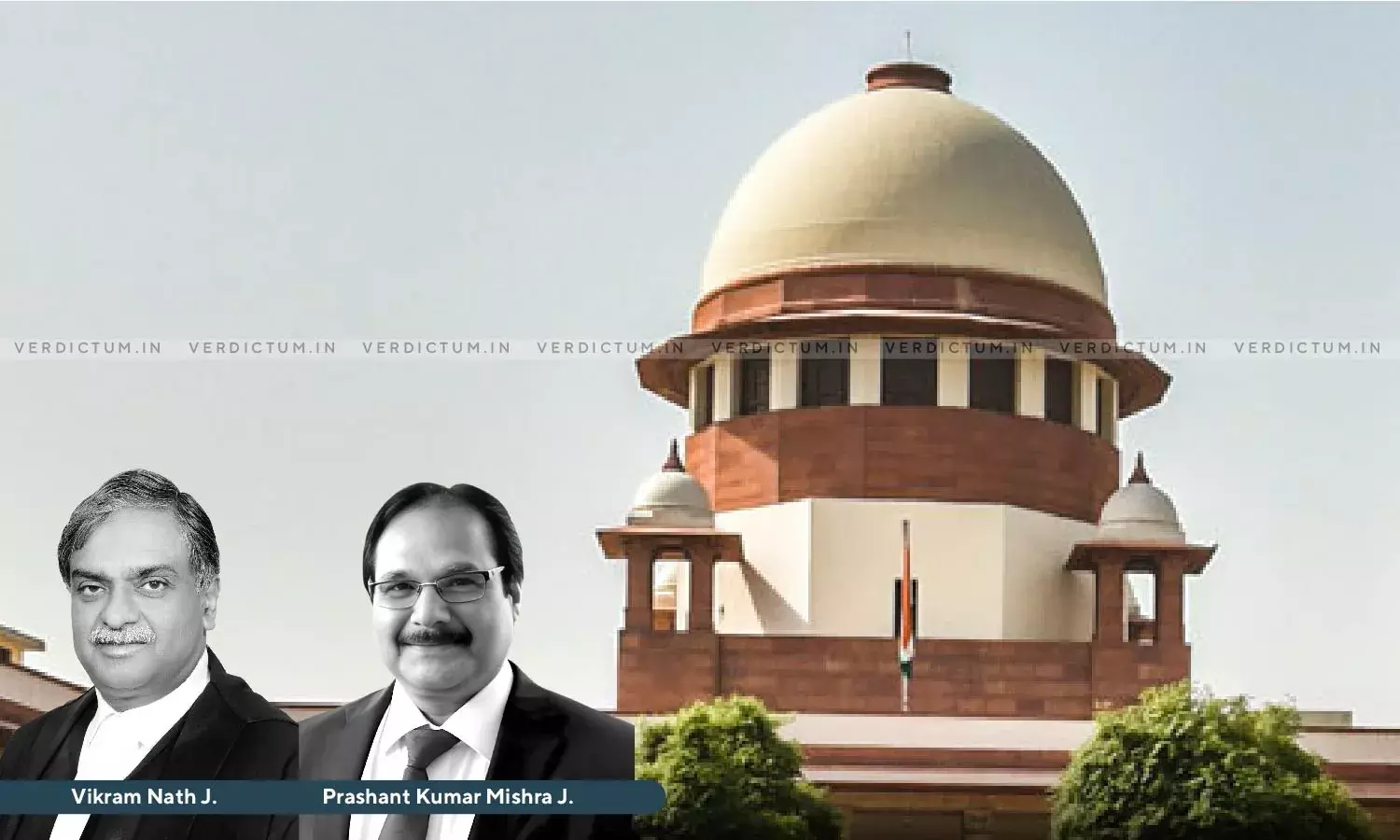Specific Performance Suit Based On Bald & Vague Pleadings Must Be Rejected; Readiness & Willingness Must Be Pleaded & Proved: SC
The Supreme Court has observed that a suit for specific performance based on bald and vague pleadings must necessarily be rejected, and it requires readiness and willingness to be pleaded and proved by the plaintiff.
In that context, the Bench of Justice Vikram Nath and Justice Prashant Kumar Mishra observed that, "The pleadings in a suit for specific performance have to be very direct, specific and accurate. A suit for specific performance based on bald and vague pleadings must necessarily be rejected. Section 16(C) of the 1963 Act requires readiness and willingness to be pleaded and proved by the plaintiff in a suit for specific performance of contract. The said provision has been widely interpreted and held to be mandatory."
The plaintiffs entered into a sale agreement on May 24, 1981, with Defendants Muni Venkata Reddy and his four sons for a property in Kodihali Village, Bangalore, measuring 5280 sq. feet. The total sale consideration was Rs. 29,000, with an advance of Rs. 12,000 paid at the time of the agreement, and the balance to be paid upon registration of the sale deed. The sale was necessary due to the vendors' need for funds, and the agreement allowed a three-month period for completion, subject to government restrictions on registration.
After three months, without execution of the sale deed by the plaintiffs, the defendants extended the period by one week on September 23, 1981, warning that failure to respond would result in selling the property to another party. On November 18, 1981, the defendants sent a legal notice stating that the plaintiffs' failure to pay the remaining Rs. 17,000 forfeited the earnest money and terminated the agreement.
The plaintiffs claimed they had paid an additional Rs. 2,000, totalling Rs. 14,000 in advance, and argued that the agreement remained valid until government restrictions were lifted. The defendants denied the additional payment on December 11, 1981, and reiterated their urgent need for money. The plaintiffs did not respond.
The defendants sold parts of the property to other parties on April 22, 1983, and June 22, 1983. On July 29, 1983, the plaintiffs filed a suit for specific performance of the agreement and a permanent injunction against further alienation of the property.
The Trial Court, on October 22, 2002, decreed the suit for specific performance, directing the defendants to execute the sale deed upon receipt of the balance consideration within three months, but denied the permanent injunction as the plaintiffs were not in possession of the property. The High Court dismissed the defendants' appeal on December 17, 2015, leading to the present appeal to the Supreme Court.
The Supreme Court emphasized that relief of specific performance is a discretionary remedy, requiring courts to exercise caution and diligence in evaluating the pleadings and evidence provided by plaintiffs. In this case, the Court dismissed a suit under the Specific Relief Act, 1963, for specific performance of a property sale agreement. The trial court had originally decreed the suit, and the High Court upheld this decision. However, the Supreme Court found that the plaintiffs failed to present sufficient pleadings and evidence to substantiate their claims.
The Court noted that the plaintiffs' actions indicated a lack of genuine interest in purchasing the property. Instead, it appeared they aimed to profit as intermediaries by blocking the property. As a result, the Court directed the defendants to compensate the plaintiffs to adjust equities. Given that 43 years had passed since the agreement and the property's current value was approximately Rs. 4 Crores, the Court ordered the defendants to pay the plaintiffs Rs. 24 lakhs for the advance payment and Rs. 6 lakhs for litigation costs, totaling Rs. 30 lakhs, within three months.
The Supreme Court highlighted that the plaintiffs did not provide specific pleadings or evidence regarding the alleged state-imposed restriction on the registration of sale deeds. The plaintiffs also failed to demonstrate any efforts to change the land's status or to tender the remaining balance to the defendants. The Court observed that despite claims of a registration ban, no evidence supported the existence or applicability of such a ban to the land in question.
Moreover, the Court pointed out that the plaintiffs did not respond to multiple communications from the defendants requesting payment of the balance sale consideration and notifying the forfeiture of the advance amount. The plaintiffs also failed to show readiness and willingness to perform their contractual obligations, as they neither tendered the balance consideration nor provided a draft sale deed before filing the suit.
The Court disagreed with the lower courts' findings that the plaintiffs were always ready and willing to fulfill their contractual duties. Consequently, the Supreme Court concluded that the decree of specific performance was unwarranted, and the suit should have been dismissed. The defendants' appeal was allowed, the impugned order was set aside, and the suit was dismissed.
Cause Title: P Ravindranath & Anr. vs Sasikala & Ors. (Neutral Citation: 2024 INSC 533)
Click here to read/download the Judgment




